Yes, training your new puppy can be challenging…but now it's super-easy with my 8-Week Old Puppy Schedule!
First of all, let me congratulate you on bringing home a new puppy!
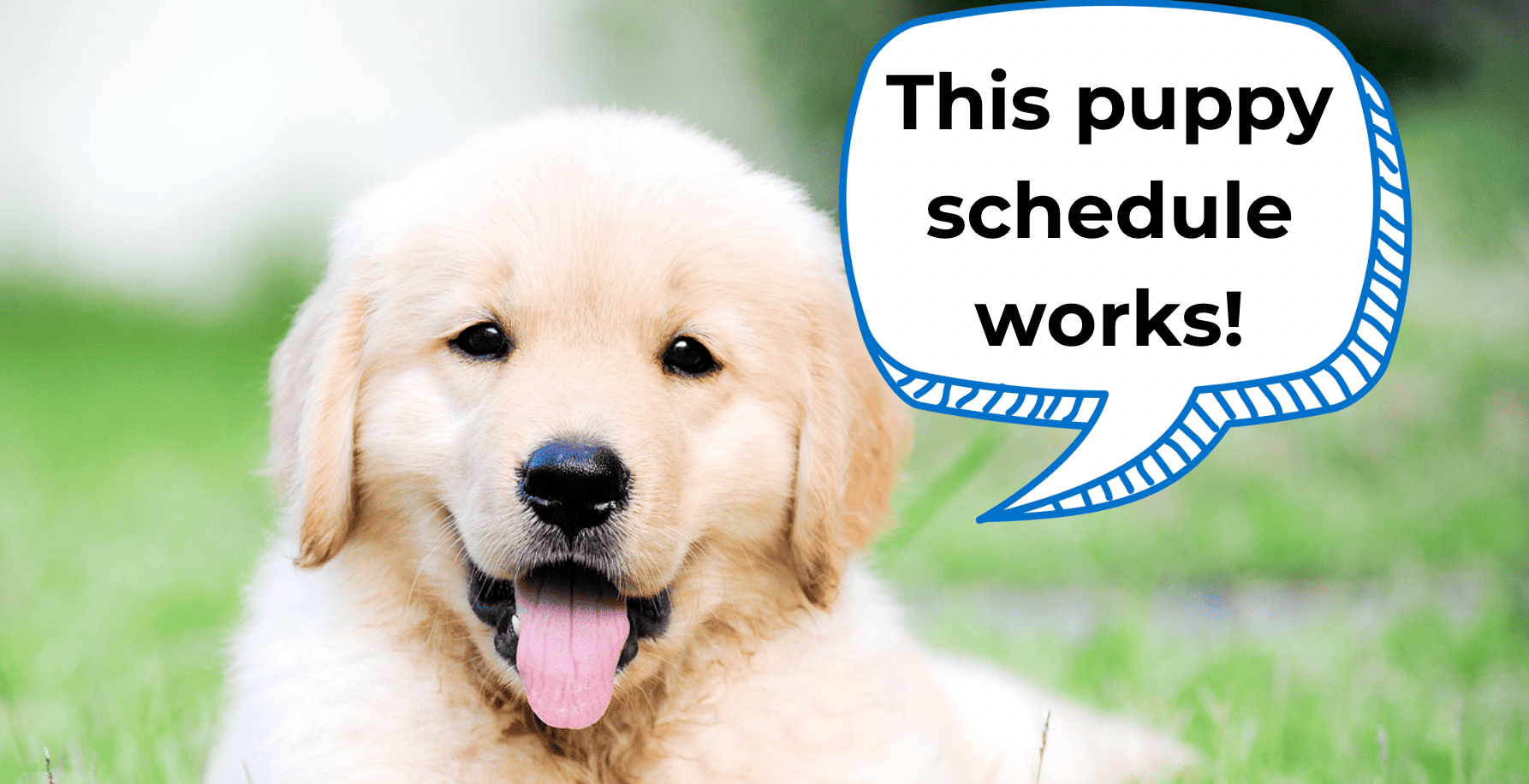
(I have a strong feeling you already have or will be welcoming a puppy in your home sometime soon.)
There's nothing quite like the joy of having a puppy in the family! The snuggles, the cuteness, the feeling of having a little angel at home, it's all so wonderful.
But something else comes with owning a new puppy: THE CHALLENGES!
There's the issue of how to correct your puppy's eating habits or how you can survive the daunting task of potty training!
Growing puppies require you to be strategic and patient!
I know from experience — I've brought many new puppies into my home over the years! And, just like bringing a new baby home, I know how quickly things can get confusing and overwhelming.

To help set up new puppy parents for success, I've created my very own 8-week-old puppy training schedule to help you set yourself—and your new pup—up for success! And I'm going to share it with you today!
This 8-week-old puppy schedule aims to help puppy owners build great habits, know how to start training puppies, perfect puppy training and potty breaks, and make puppy care much more in order.
Key Takeaways
- The puppy schedule emphasizes the critical role of a structured routine in addressing common challenges, such as eating habits and potty training, to create a solid foundation for a new puppy's growth.
- Introducing the PEES structure (Potty, Exercise, Eat, Sleep), the schedule provides a simplified framework for organizing a puppy's day, offering practical insights and tips for effective training and care within each essential category.
- Acknowledging the evolving needs of a growing puppy, the schedule recognizes the importance of flexibility and adaptability, encouraging new puppy parents to initiate the routine around 8 weeks while understanding that life commitments may require adjustments to the schedule.
8 Week Old Puppy Schedule: What Is It For?
The Doggy Dan 8-Week Old Puppy Schedule is created to solve common issues puppy owners face during the first few days. These challenges include:
- The Explorative Taste Stage
- Energetic Peaks
- Puppy Worries
- Eating Habits
- Puppy Potty Training and The Right Potty Schedule
and many more!

Bringing home a new puppy is similar to bringing home a new baby. And while a puppy might not cause a big of a transition as a new human would, they both need a system or schedule to thrive in your home!
Why Your Puppy Needs the 8-Week-Old Puppy Schedule
If you've ever had a baby or have a friend or family member with kids, you know how important it is to have a schedule or chaos ensues.
The new baby must eat every 2-3 hours. It's essential to ensure the baby has a certain number of dirty diapers throughout the day. And, of course, keeping your child on a sleep schedule is an absolute must if mom or dad plan on getting any sleep.

Your puppy needs the same training routines every day, or I guarantee you puppy parenthood will become much more difficult than needed.
That’s why I’ve created my 8-Week-Old Puppy Schedule: The Ultimate Guide to Training Your New Puppy.
(BTW this is an update of my older post: Puppy Schedule for 8-10 Weeks Old)
Having a puppy schedule in place from the day you bring your puppy home IS THE KEY to helping create a solid foundation for your pup as it grows into a mature dog.
Remember, the ideal time to start a schedule is when your puppy is around 8 weeks. Puppy development and habits MUST be formed around this time.

And I'm so excited to share my puppy schedule with you, including videos from my very own Project Moses Video Diary!
What’s the optimal schedule for your new pup? Keep reading to find out.
A Little Disclaimer…
I've packed a lot of information into an hour-by-hour puppy schedule to provide you with the most comprehensive puppy schedule possible.
It may look a little overwhelming.
The training schedule for your puppy might even make you think…
“How is it humanly possible to stick to such a routine week after week?”
I want you to know one thing before you scroll any further.
I 100% understand that you have a life outside of your puppy. Between kids, jobs, and other activities, it's not always possible to provide your puppy with 100% of your attention weekly, month after month.

The goal of this puppy schedule isn't to overwhelm you. It's to give you a solid framework that you can work off of.
I designed this schedule to help educate you on how to best set up your puppy's day, from feeding schedules to potty training.
I advise you to do as best as possible to stick to the schedule when you first bring your new puppy home.
As your puppy ages, understand that they WILL become more independent and require a less structured schedule.
You may need help to follow this schedule completely, but I guarantee it will be an incredibly helpful resource that will enable you to set your puppy up for success as you make the transition into puppy parenthood!
Doggy Dan's 8-Week-Old Puppy Schedule: Simplifying The Puppy Parenting Process with the PEES Structure
Here's why this detailed schedule for puppies works.
If you look online for puppy schedules, you can quickly become overwhelmed by the information available. Not to mention the complexity of some of the plans put out there!
No wonder people give up on routines after only a few days of putting them into practice.

Here's the good news…this ultimate puppy schedule can be broken down into 4 main needs….
- Potty
- Exercise
- Eat
- Sleep
…otherwise known as the PEES structure!
As you’ll find out, a lot of your puppy’s schedule will revolve around potty breaks, so it’s my hope that you will find this acronym easy to remember!
What You Will Learn from the PEES Structure
The PEES structure breaks down the four most important parts of your puppy’s day, and the order in which these activities should occur to set the puppy up for success.

At the bottom of this article, you'll find my hour-by-hour schedule, which clearly outlines when these activities should take place!
Before unveiling the schedule, I want to equip you with crucial training information. Each letter (PEES) of the schedule is packed with valuable insights that will empower you in your puppy's development.
I hope that you can “plug and play” with these activities in correlation with the schedule to keep your puppy focused, engaged, and on a well-rounded system. Check it out now…
A More Detailed Walk-Through of the 8-Week-Old Puppy Schedule
Looking at the schedule above, it's easy to piece together what your puppy should be doing throughout the day.

That being said, there are a bunch of important subcategories within each of the main topics. For example, “How do I safely leave my puppy alone to rest during Sleep time?” or “What do I need to know about feeding my new puppy meals during Eating time?”
Let’s break down the four main categories so I can provide you with some incredibly important information on each topic that will help set your puppy up for success.
Potty (P): Some Insight Into My Best Toilet Training Practices

Potty training a puppy is something many puppy parents struggle with. However, when you make potty train sessions a regular part of your daily routine, it becomes much easier for your pup to get a hold of using the bathroom in appropriate places. This training should have a consistent schedule.
Remember this: puppies will follow what's natural to them. If they have become used to peeing everywhere, there's a high chance you will have a hard time correcting that. Training them early and consistently IS THE KEY.
Important Points to Remember When Potty Training Puppies
- Taking your new puppy out to use the bathroom MUST be the first thing you do every morning, as your little pal simply isn’t capable yet of holding their urine for really long periods.
- Pet owners, it's not okay to sleep in and wait until 10 AM to give your pup a potty break. If you do so, I guarantee you'll become frustrated as you wake up to potty accidents. Before you get your coffee, watch the news, get showered for the day, etc. get your puppy outside immediately.
- Bring your puppy to the area you want them to potty in, and give your pup ample time to do their business. Your pup will likely use the restroom pretty quickly, but if they don't (as some puppies are easily distracted) let your puppy settle in first (at least 15 minutes). Give some encouragement (perhaps the command “Go Potty”) while you wait.
- After your pup does their business, reward them with a pat or a treat, as your new pal might need a little extra reward at this young age.

For the most part, potty training isn't difficult. It's all about being proactive and setting your puppy up to win.
If you need extra guidance on toilet training, I encourage you to sign up for my FREE toilet training video course here!
To ensure you're providing your pup with enough potty breaks throughout the day, please download a copy of my Puppy Potty Time Chart, a puppy potty training schedule tracker where you can log the times you're taking your pup out for a bathroom break.
Exercise (E): Fun Activities to Keep Your Puppy Engaged and Moving During the Day

Like toddlers, puppies are full of energy and must be kept active during the day so they don't go crazy or become destructive.
Fortunately, there are numerous training methods at your disposal to keep your puppy active and engaged. The activities I'm about to share not only fulfill these needs but also incorporate various training principles. Mastering these methods will give you a sense of accomplishment and pride in your puppy's progress.
Check out the following activities you can plug into your puppy schedule “E” hours.
Socialization
All dogs have social needs, and most dogs desire to play and interact with other dogs. Socialization is one of the foundations of dog training in a puppy's life. When dogs are socialized, they are more receptive to training. Even adult dogs behave better when socialized.
Socializing a dog with other dogs early is important for ensuring that the pup knows how to play and interact with other canines appropriately.

If a puppy doesn't get the chance to meet lots of different people and animals or doesn't get to experience various places when they're young, they might grow up to be dogs that have trouble behaving. They could become either really scared or aggressive, which can be a problem.
Knowing how important socialization is, I recommend you start finding opportunities to socialize your pup as soon as possible! (You can hire a pet sitter if time restricts you). It's a fun activity that's good for your puppy's training and can also help tire your pup out as he/she is full of all that puppy energy.
Of course, there are a few things you need to think about before exposing your puppy to other dogs. For example:
- Is your puppy properly vaccinated so he/she doesn't pick up any dangerous illnesses while playing with another dog?
- Do you personally know the dog you're introducing your puppy to/know that the dog is friendly and safe?
- Have you put safety measures in place to ensure both dogs can remain calm and happy during their playdate?
- Do your puppies thrive and function well in the company of other dogs?
A lot goes into socializing a puppy to prevent behavioral issues with other dogs down the road.

Because this is such an important topic, I want to share with you 3 videos from my Project Moses Video Diary so you can see first hand how I handled socialization with Moses during three different stages of his early life (I filmed the raising of my puppy, Moses, from 8 weeks to 1 year and created a video-diary course — these are just a few of the 70+ videos covering the important stages of his first year that you can access in my Puppy Coach program).
Watch the progress of Moses and socialization in these 3 videos below, as he grows from 10 weeks to 8 months (in the Puppy Coach Video Diary, there are so many more videos in between these stages that show vital nuances in his training and development).


Playtime
Having a handful of puppy toys on hand makes it easy to keep your pup entertained throughout the day.
Whether you decide to take your puppy outside for a game of fetch or monitor him indoors with a puzzle toy, there are many ways you can keep your puppy both mentally and physically stimulated.

Here are a few of my favorite toys to have on hand…
- A ball/frisbee for a game of fetch.
- An antler bone which provides a constructive and natural chewing source.
- A puzzle toy for mental stimulation.
- A kong you can fill with a treat to keep your pup busy.
- A soft, plush toy…some puppies love carrying around a cuddly toy!
Puppies are incredibly smart! When you provide them with toys, they quickly learn what they are/are not allowed to play with in your home. For example, giving your dog a bone to chew on should help keep your pup from chewing up your favorite pair of slippers.
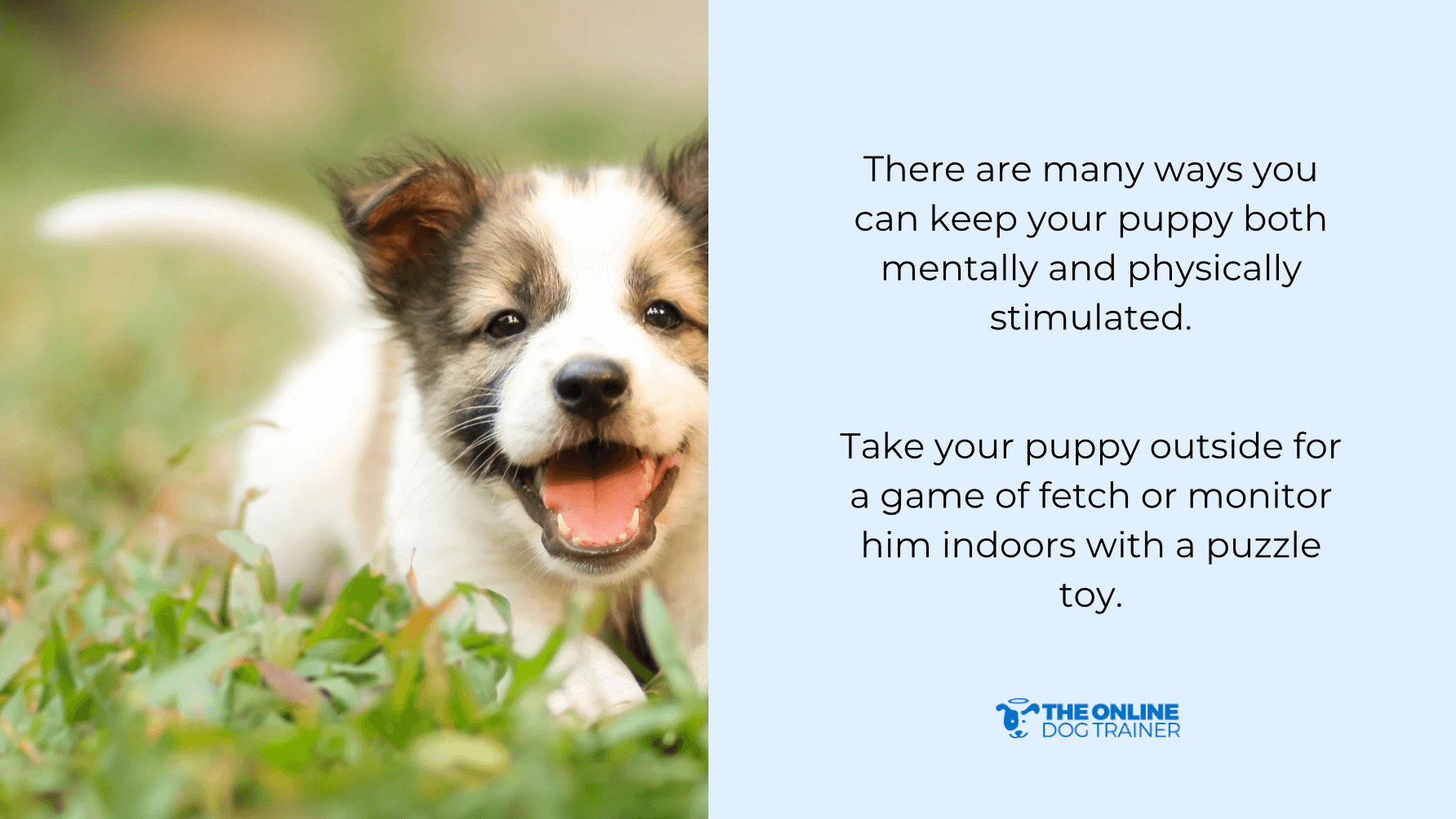
If you’re struggling with chewing, I encourage you to take a look at an article I wrote on how to get your dog from chewing on and destroying your stuff Read it now!
Leash Training
At 8-weeks-old, it's likely that your puppy will struggle to walk on a leash–let alone be able to walk very far before they decide to take a nap on the grass!
That being said, leash training is something you should start right away with your puppy in order to teach him/her proper outdoor walking manners.

If you're house training, you can start in your backyard getting your puppy accustomed to using a leash with a little stroll around the grass. As your puppy gets older and a little more aware of what going on a walk means, I encourage you to use the resources below…
View my Ultimate Guide to Leash Training here!
Listen to My Podcast on Overexcited Behaviors While on a Walk!
Eat (E): Setting Your Pup Up for Success at Mealtime

Feeding your puppy might seem like a simple, straightforward part of owning a dog. However, most people don't realize how big of an impact food can have on various aspects of your puppies training.
For most puppies, not having a concrete mealtime routine or structure can cause more behavioral issues down the road including aggression, resource guarding, and disobedience.
Here are some things you can establish for mealtimes.
#1: Setting Up a Designated Mealtime Area
Always make sure to change your puppy's water so it's fresh and clean. Serve his/her breakfast in a designated dog bowl.

Routine and familiarity on mealtimes can help dogs stick to the behavior expected of them.
#2: Be Clear with Mealtime Commands
You can help your puppy remain calm around food by asking them to sit and wait until they’ve been given the command to go ahead and eat.
Of course, this is more difficult with an 8-week-old puppy, but it's not impossible to set boundaries so your pup isn't jumping all over you. Following a puppy feeding schedule
#3: Interact with Your Puppy
Once you've given your pup their food, you can practice gently giving your pup a pet while they eat or even picking up the food bowl once in the middle of their meal time. Of course, you don't want to be a pest to your pup.

But, interacting with a puppy while they eat can help negate aggressive food behaviors down the road while gently reminding your pup that you are the provider.
Like I said, don't be an annoyance as it's not fair to pester your puppy while they enjoy a meal. But a little interaction is very helpful when it comes to teaching your puppy to be gentle with food.
Setting your puppy up for success with food is so important I’m going to share an exclusive video with you from my Project Moses Video Diary—one of many videos within a paid program that show you step-by-step how to work with your new puppy as I train my puppy, Moses.
Moses is 5 months old in this video. However, the principals are the same regardless of whether your puppy is 8 weeks or 8 months.
Watch the video now…
#4: Determine the Frequency of Meals
Transitioning from mother’s milk to puppy food is a big change for your little puppy’s stomach. This transition is often made easier when you feed your puppy multiple smaller meals throughout the day.

That's why you'll notice four distinct feeding times on my puppy schedule! Of course, as your puppy grows, their feeding needs will change and become less frequent.
I recommend you talk to your vet to get their advice on what's best for your individual puppy based on your puppy's breed. But, you'll likely find that most professionals stick to a feeding chart similar to the one I recommend.
For reference, look at my recommendations for how much your puppy should eat as they grow.
What Are The Best Puppy Food Options?
It’s likely your vet has already advised you on the best food options for your new puppy. However, if you’re looking for some homemade options, I encourage you to check my resources below…
Learn more about healthy homemade dog food recipes here!
Discover 7 special treats that canines crave!
Sleep (S): Providing Your Puppy with a Safe Spot to Sleep and Relax

Just like a new baby, your puppy will require a lot of sleep during the first year of life. Therefore, it's essential to schedule time to let your puppy sleep or rest without being bothered by anyone…including other animals in your home.
Setting Up a Safe Sleep Space
It's crucial that you set up a safe and comfortable space where you can leave your puppy without worrying about them getting into trouble while not being supervised.
I have a video that I want to share with you that I've pulled directly from my Project Moses Video Diary. In this video I will show you how I set up a safe space for my puppy Moses so you can set up a similar space in your home.
Take a look at Moses's living arrangements at 8 weeks old!
Making Your Puppy Feel Safe
It’s important to understand that your tiny little puppy probably won’t like being left by themself. After all, a puppy is just a baby who wants his/her “mommy.”

However, the more you practice spending time away from your pup, the easier it will become for both of you! The key is to ensure your puppy feels safe, and not to give into those sad little squeaks every time you leave the room.
This is such an essential part of your puppy's schedule that I filmed the steps I took on leaving Moses alone when he was just 8 weeks old. I'm sharing this exclusive video from my Project Moses Video Diary in hopes that it will help you avoid any problems or serious behavioral issues (like separation anxiety) in the future!
Watch now!
Overnight Crate Training
The long overnight bedtime haul can be challenging for puppies…especially when they are left alone in the dark and can’t see where you are.

One tip I have—if you have a puppy that howls and whines at night—is to slowly move your puppy's crate out of your room night after night. Each evening, move your puppy another foot or two away from your bed until your puppy is eventually in a different room.
The gradual movement will not be noticed by your puppy, and it's a great way to transition your puppy to being more independent!
↓ Download the 8-Week-Old-Puppy Schedule By Hour ↓
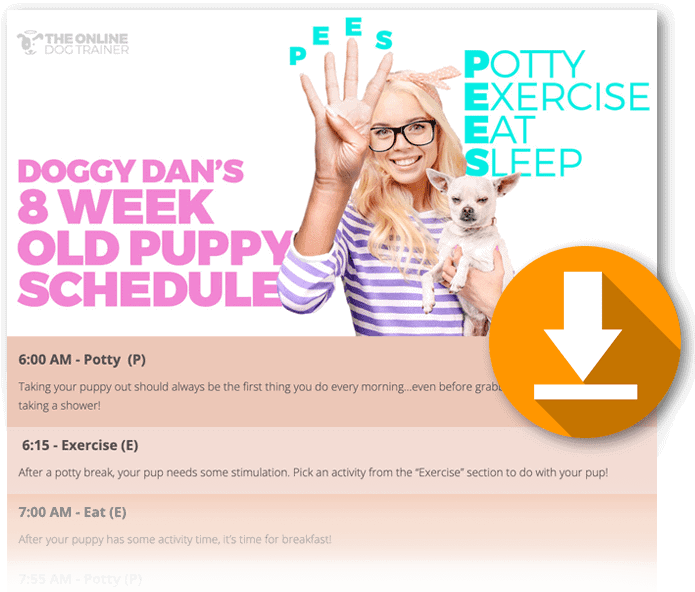
Doggy Dan’s 8-Week-Puppy Schedule
Now that we've covered everything that goes into my 8-week-old puppy schedule, I want to share with you an hour-by-hour outline you can use to structure your day!
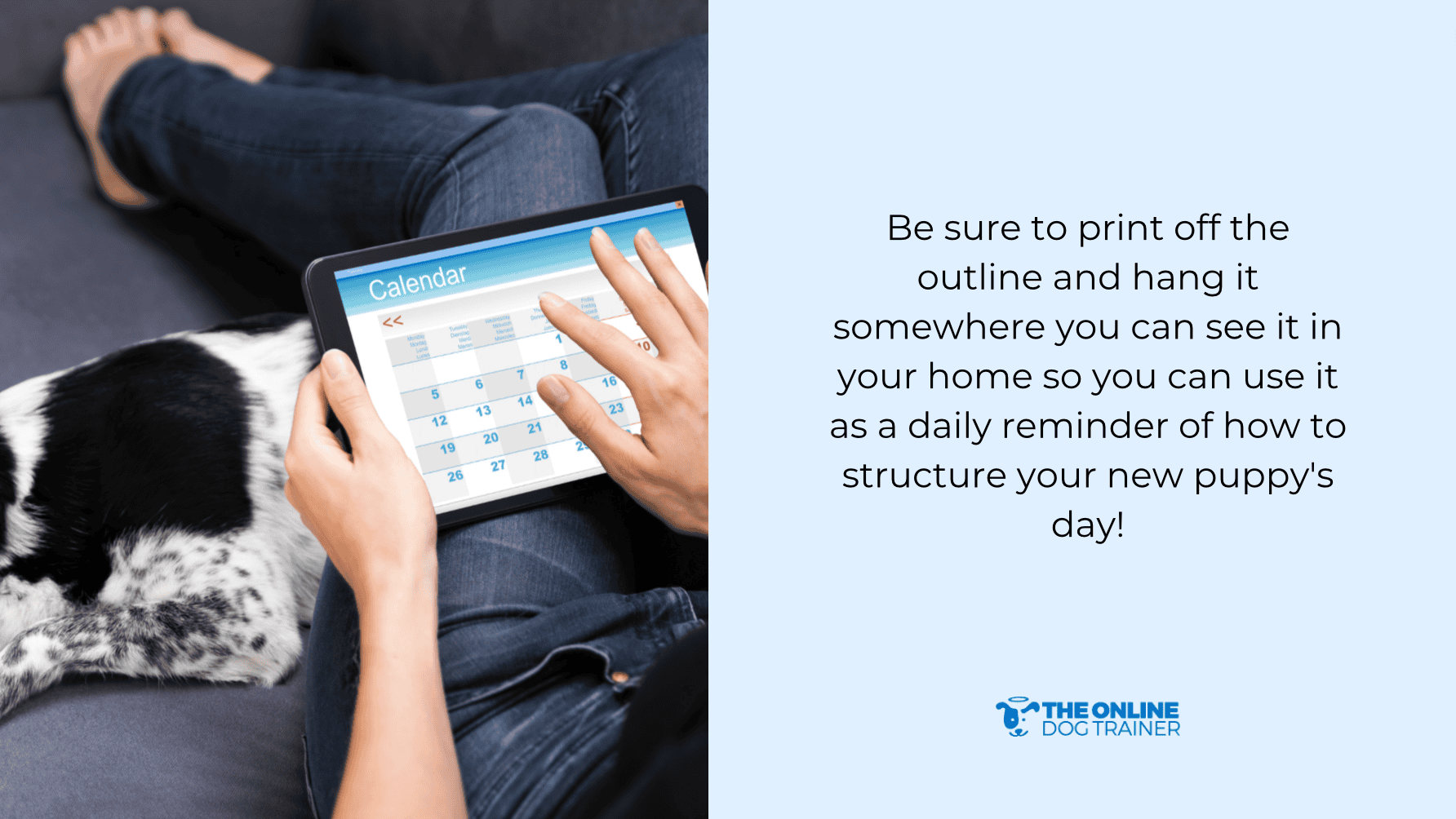
Be sure to print off the outline and hang it somewhere you can see it in your home so you can use it as a daily reminder of how to structure your new puppy's day!
8 Week Puppy Schedule Sample
6:00 AM – Potty (P)
Taking your puppy out should always be the first thing you do every morning…even before grabbing a cup of coffee or taking a shower!
6:15 – Exercise (E)
After a potty break, your pup needs some stimulation. Pick an activity from the “Exercise” section to do with your pup!
7:00 AM – Eat (E)
After your puppy has some activity time, it’s time for breakfast!
7:55 AM – Potty (P)
Eating often stimulates your puppy’s need to use the restroom. Get your puppy outside for a potty break.
8:00 AM – Sleep Time (S)
Time for a rest! Put your pup in his safe sleeping area so you can get some stuff done!
8:45 AM – Potty (P)
Yes, it’s time for another potty break! Be sure to get your pup outside in order to prevent an accident from happening in your home!
9:00 AM – Exercise (E)
Your puppy is fully recharged and ready for some exercise!
10:00 AM – Sleep (S)
Time for a rest! Let your puppy have some quiet time alone in his designated puppy area.
10:45 AM – Potty (P)
It’s potty break time! Make sure you get your pup outside!
11:00 AM – Eat – Feed Time #2 (E)
Feed time #2 ensures your pup gets a steady stream of nutrition throughout the day without overfilling his/her tummy. Talk to your vet about how much you should feed your puppy at every meal!
11:15 AM – Exercise (E)
With a full belly, your pup is ready to play again! Have fun!
12:00 PM – Potty (P)
Time for another bathroom break! Be sure to get your puppy outside!
12:15 PM – Sleep (S)
Your puppy needs a rest! Place him in the crate/secure puppy area and enjoy your lunch!
1:00 PM – Exercise (E)
Your puppy needs something fun to do! Go for a romp in the grass or pull out a fun toy and get some playtime in!
1:45 PM – Potty (P)
You know the drill…make sure your puppy has an opportunity to use the restroom!
2:00 PM – Eat – Feed Time #3 (E)
It’s time for an afternoon meal! Bon Appetit!
2:15 PM – Exercise (E)
Make some time to play with your puppy!
3:00 PM – Sleep (S)
It’s time for your puppy to take another rest! You probably need one too!
4:00 PM – Potty (P)
After some time resting inside, be sure to get your pup out for a potty break!
4:15 PM – Exercise (E)
Your pup is ready for some more fun! Find a fun activity to enjoy together!
5:00 PM – Eat – Feed Time #4 (E)
It’s time for your puppy’s final feed time! The closer you stick to a feed schedule every day, the more predictable your puppy’s potty schedule will become.
5:15 PM – Potty (P)
Be sure to head outside for a bathroom break after dinner!
6:30 PM – Exercise (E)
Set your puppy up with a fun toy or spend some time playing on the floor together!
7:30 PM – Sleep (S)
After some activity, put your puppy in their safe space for a rest break.
8:15 PM – Potty (P)
After rest time, make sure your puppy gets a chance to use the restroom!
8:30 PM – Exercise (E)
It’s time for the last activity time of the night! Play with your pup and do your best to tire them out so they will sleep during the night!
10:00 PM – Final Potty and Bedtime
Set your puppy up for success by taking them out one final time for a potty break before bed. After your puppy goes potty, bring them directly to his/her crate for bedtime.
Simplifying the Puppy Schedule with The Puppy Coach Program

I just threw a lot of information at you regarding my puppy training schedule. It's possible, but it may seem overwhelming! That's because a lot goes into the responsibility of bringing a new puppy into your home.
But, if you break it down into your puppy's 4 main need categories (Potty, Eat, Exercise, Sleep) you can ensure your new puppy gets everything they need to thrive during their first few weeks in your home.
The more complex piece of the puzzle is adapting your schedule as your puppy grows. After all, an 8-month-old puppy has vastly different needs than an 8-week-old puppy.
What's the next resource to use once your puppy hits 4 months, 6 months, or 8 months old?
The best way to keep up with your puppy’s ever-changing needs…my comprehensive Puppy Coach training program.
The Puppy Coach training program is a step-by-step instruction manual that provides EVERYTHING you need to know about caring for your puppy during his/her entire puppyhood. In all training sessions, you can help your young puppies be prepared for better training in the future.
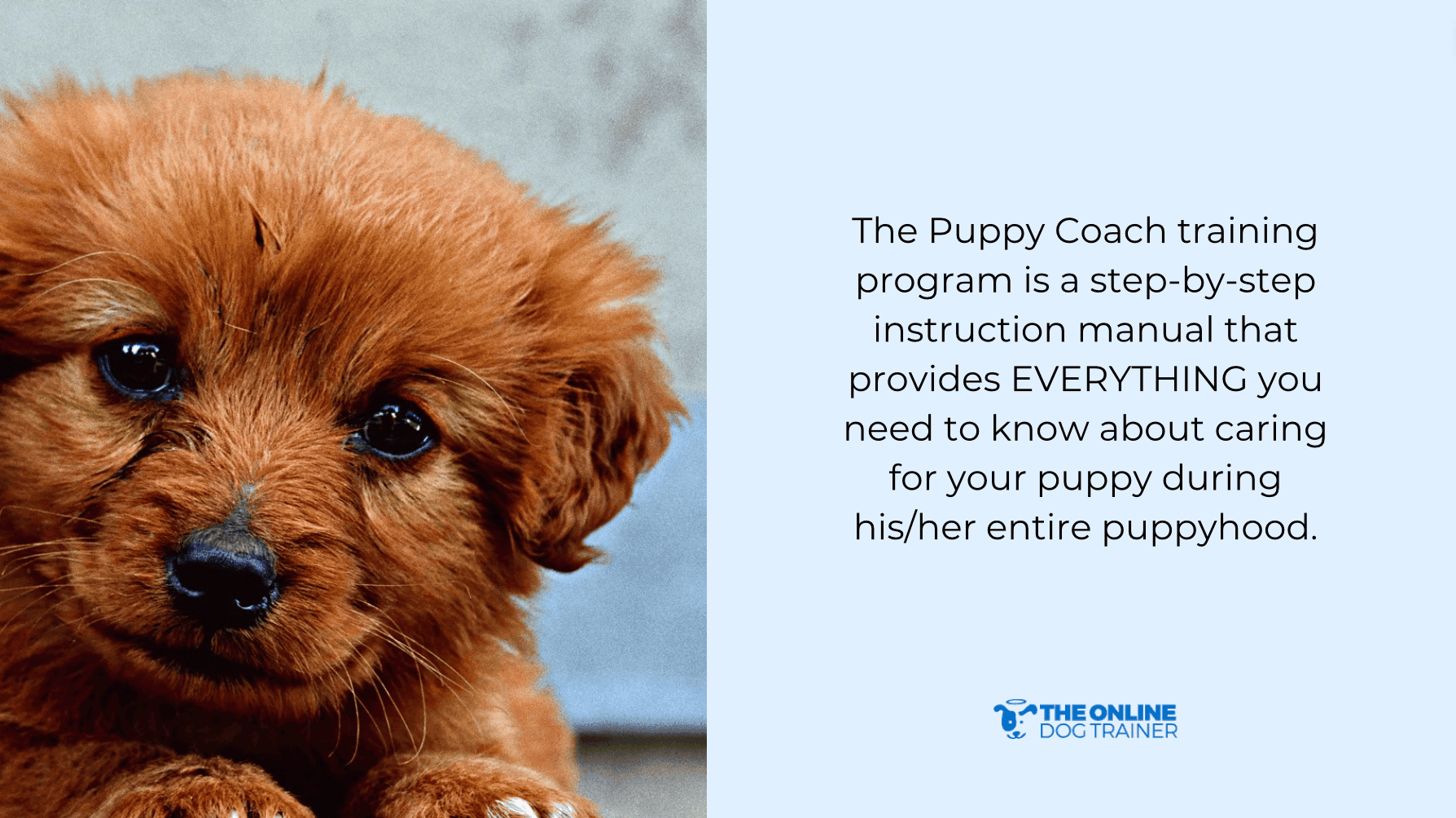
It's a roadmap that covers everything from lessons on basic obedience training to how to manage serious dog behavioral issues. It contains 70+ videos on how to set your puppy up for success as it ages into adulthood.
And I can guarantee that it's the only resource any new puppy parent needs because it contains two of my most powerful puppy training resources: my Project Moses Video Diary and The Perfect Puppy Program.
So what's your next step as a puppy parent? I encourage you to at least take a look at the program below…
Find out more about the Puppy Coach training program here!
I wish you the best with your new canine companion. Here’s to many years of happiness and good health!

~ Doggy Dan


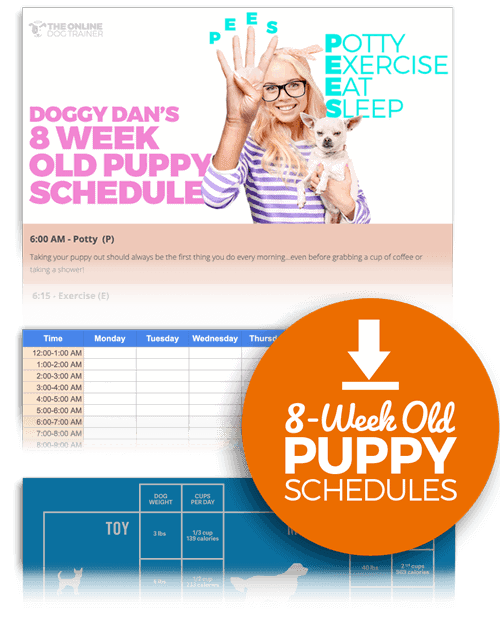
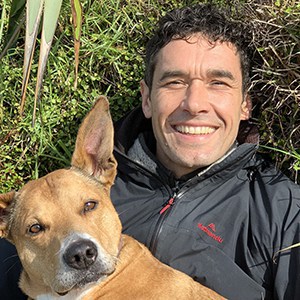
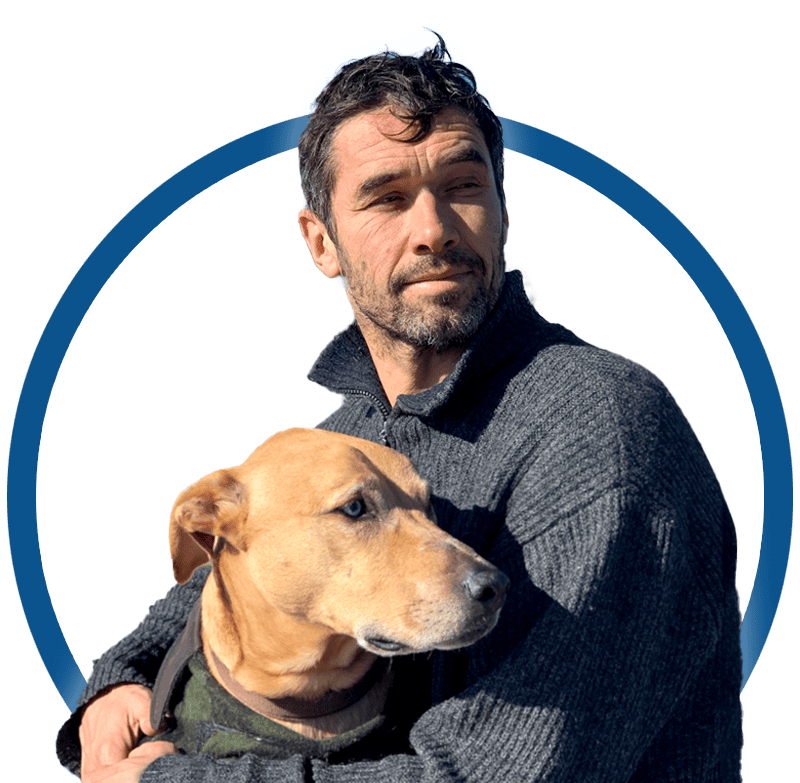
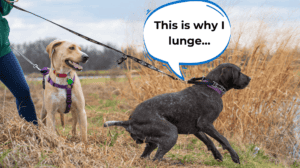
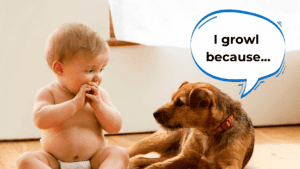
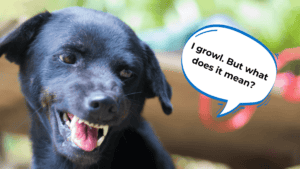
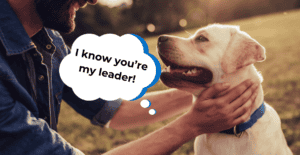
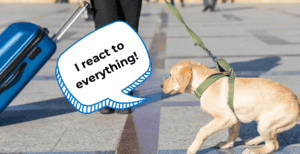
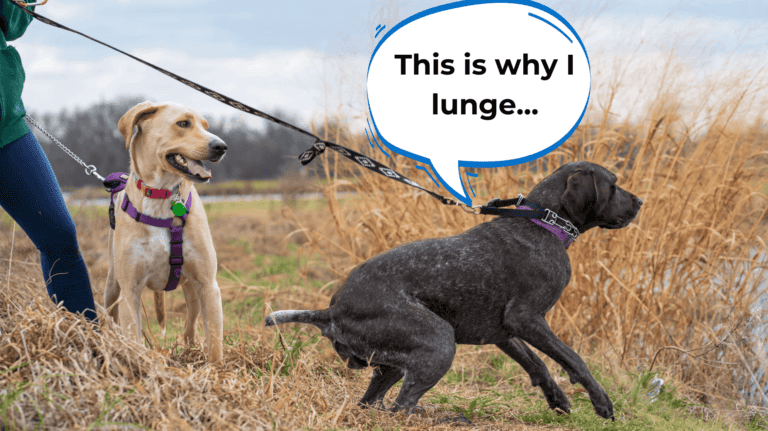
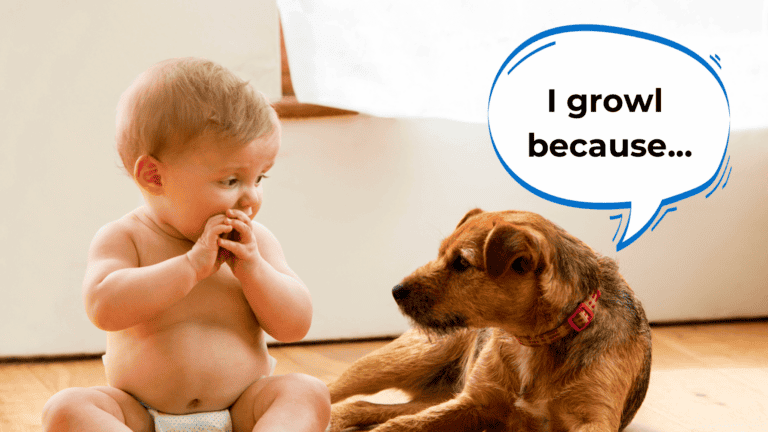
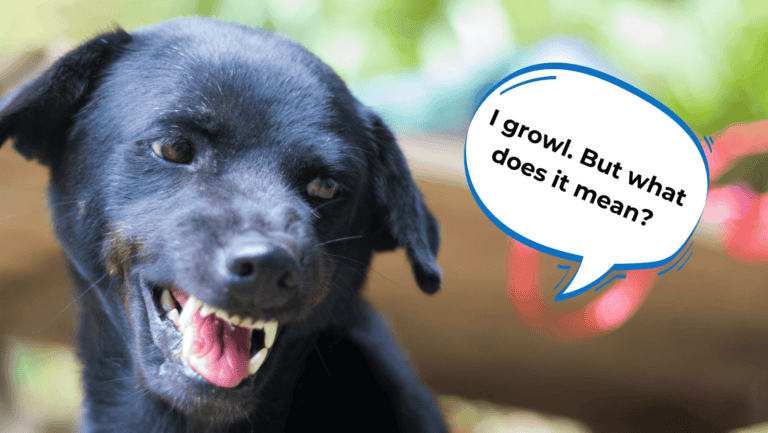

5 Responses
Do you mind if I quote a few of your posts as long as I provide credit and sources back to your webpage? My website is in the very same niche as yours and my visitors would really benefit from some of the information you present here. Please let me know if this alright with you. Appreciate it!
The best place to start is here: https://www.theonlinedogtrainer.com/affiliates/join
Cheers, Dan
I won’t get my puppy until 7/30 but I have started to prepare myself. I’ve learned so much just reading this but haven’t watched any videos yet. I will be saving this & constantly refer to it. I have had kittens & cats for 35 years so this will be quite the change for me.
I’m really glad you found my Blog helpful Maria! Wishing you and your puppy a wonderful life together! Doggy Dan
What a wonderful post!